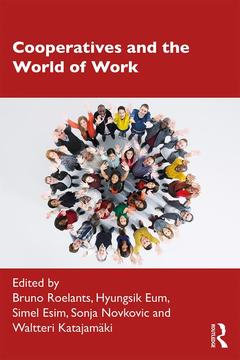Description
Cooperatives and the World of Work
Coordinators: Roelants Bruno, Eum Hyungsik, Esim Simel, Novkovic Sonja, Katajamäki Waltteri
Language: English
Subjects for Cooperatives and the World of Work:
Keywords
SME Cluster; Cooperatives; Waste Pickers; Work practices; Multi-stakeholder Cooperative; Decent work; Dakshina Kannada District; Sharing economy; ILO Recommendation; Employee relations; Women Waste Pickers; Labour; Cooperative Movement; International Labour Office; Consumer Cooperatives; ILO; Sanchez Bajo; First World War; Decent Work Agenda; social changes; Platform Cooperativism; International Labour Organization; Local Development; ILO Member State; International Cooperative Movement; Raising Gender Awareness; Dakshina Kannada; Self-help Group Formation; Coffee Cooperatives; Long Term Action Plans; Non-salaried Work; Civil Society; Employment Cooperatives; Worker Cooperatives; Cooperative Model; Solidarity Economy
Publication date: 07-2019
· 15.6x23.4 cm · Paperback
Publication date: 07-2019
· 15.6x23.4 cm · Hardback
Description
/li>Contents
/li>Readership
/li>Biography
/li>
As the world of work and jobs is more uncertain than ever because of various trends impacting it, including the rise of robotics and the gig economy, Cooperatives and the World of Work furthers the debate on the future of work, sustainable development, and the social and solidarity economy of which cooperatives are a fundamental component.
Throughout the book, the authors, who are experts in their respective fields, do not limit themselves to praising the advantages of the cooperative model. Rather, they challenge the narrow understanding of cooperatives as a mere business model and raise debate on the more fundamental role that cooperatives play in responding to social changes and in changing society itself. The book is unique in tracing the historical connection between cooperatives and the world of work since the end of the First World War and the recent shifts and restructuring in enterprise and the workplace. It presents a redefinition of the very concept of work, focusing on organizational innovation.
This book is published in recognition of 100 years of the International Labour Organization, and gathers together research from leading experts who were brought together at an event co-hosted by the International Co-operative Alliance (ICA) and the International Labour Organization (ILO).
Introduction. 1. Work and cooperatives: A century of ILO interaction with the cooperative movement. 2. Cooperatives and the future of work. 3. Cooperatives and fundamental principles and rights at work: Natural disposition or commitment to action?. 4. The autonomy or heteronomy of cooperative worker ownership. 5. Work and employment in the informal economy and new forms of work: How can the cooperative model be an answer. 6. "Coffee has given us Power to Act": Coffee cooperatives and women empowerment in Rwanda’s rural areas – A case study of Karaba coffee cooperative. 7. The changing cooperative landscape in the world of work: A study of women empowerment through participatory strategies in India. 8. Waste cooperatives in Brazil: Exploring links between cooperative ideals and raising gender awareness. 9. Cooperatives and trade unions: From occasional partners to builders of a solidarity-based society. 10. Saving jobs and businesses in times of crisis: The Italian road to creating worker cooperatives from worker buyouts. 11. Cooperatives of independent workers in Finland: A unique forum for self-employment. 12. Labour transformation and institutional re-arrangement in France: A preliminary study of a business and employment cooperative. 13. Multi-stakeholder cooperatives as a means for jobs creation and social transformation. 14. An internet of ownership: Democratic design for the online economy. Conclusion. Index
Bruno Roelants is the Director General of International Co-operative Alliance and was formerly Secretary General of CICOPA and of its regional organization, CECOP CICOPA-Europe.
Hyungsik Eum is the Data Analyst at CICOPA and Strategy and Statistics Coordinator of the International Co-operative Alliance.
Simel Eşim is the Head of the Cooperatives Unit of the International Labour Office in Geneva. Prior to this, she was a Senior Technical Specialist in the ILO’s Regional Office for Arab States.
Sonja Novkovic is Chair of the Committee on Cooperative Research of the International Co-operative Alliance Research Committee. She is also the Academic Director in the Co-operative Management Education program and Professor of Economics at Saint Mary's University in Halifax, Canada.
Waltteri Katajamäki works at the International Labour Office in Geneva as a Technical Officer on Rural Economy and previously worked at the ILO’s Cooperatives Unit.




